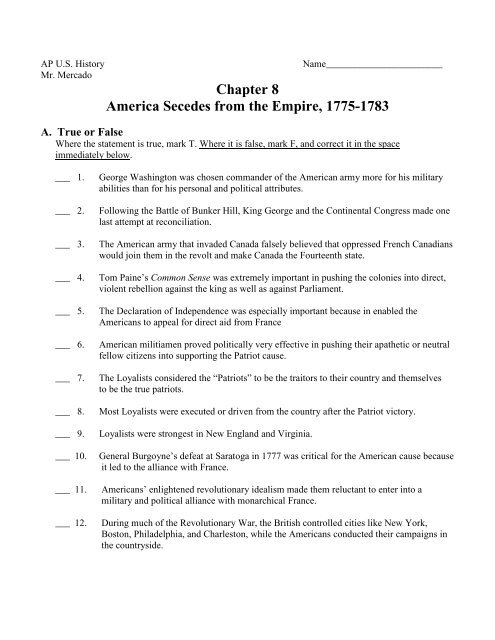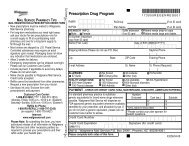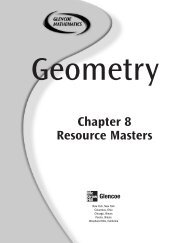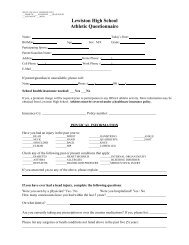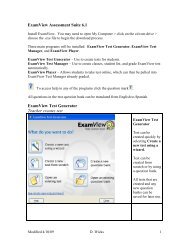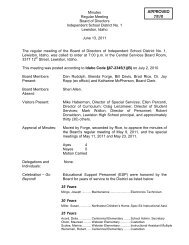Chapter 8 America Secedes from the Empire, 1775-1783
Chapter 8 America Secedes from the Empire, 1775-1783
Chapter 8 America Secedes from the Empire, 1775-1783
- No tags were found...
You also want an ePaper? Increase the reach of your titles
YUMPU automatically turns print PDFs into web optimized ePapers that Google loves.
AP U.S. HistoryMr. MercadoName________________________<strong>Chapter</strong> 8<strong>America</strong> <strong>Secedes</strong> <strong>from</strong> <strong>the</strong> <strong>Empire</strong>, <strong>1775</strong>-<strong>1783</strong>A. True or FalseWhere <strong>the</strong> statement is true, mark T. Where it is false, mark F, and correct it in <strong>the</strong> spaceimmediately below.___ 1.___ 2.___ 3.___ 4.___ 5.___ 6.___ 7.___ 8.___ 9.___ 10.___ 11.___ 12.George Washington was chosen commander of <strong>the</strong> <strong>America</strong>n army more for his militaryabilities than for his personal and political attributes.Following <strong>the</strong> Battle of Bunker Hill, King George and <strong>the</strong> Continental Congress made onelast attempt at reconciliation.The <strong>America</strong>n army that invaded Canada falsely believed that oppressed French Canadianswould join <strong>the</strong>m in <strong>the</strong> revolt and make Canada <strong>the</strong> Fourteenth state.Tom Paine’s Common Sense was extremely important in pushing <strong>the</strong> colonies into direct,violent rebellion against <strong>the</strong> king as well as against Parliament.The Declaration of Independence was especially important because in enabled <strong>the</strong><strong>America</strong>ns to appeal for direct aid <strong>from</strong> France<strong>America</strong>n militiamen proved politically very effective in pushing <strong>the</strong>ir apa<strong>the</strong>tic or neutralfellow citizens into supporting <strong>the</strong> Patriot cause.The Loyalists considered <strong>the</strong> “Patriots” to be <strong>the</strong> traitors to <strong>the</strong>ir country and <strong>the</strong>mselvesto be <strong>the</strong> true patriots.Most Loyalists were executed or driven <strong>from</strong> <strong>the</strong> country after <strong>the</strong> Patriot victory.Loyalists were strongest in New England and Virginia.General Burgoyne’s defeat at Saratoga in 1777 was critical for <strong>the</strong> <strong>America</strong>n cause becauseit led to <strong>the</strong> alliance with France.<strong>America</strong>ns’ enlightened revolutionary idealism made <strong>the</strong>m reluctant to enter into amilitary and political alliance with monarchical France.During much of <strong>the</strong> Revolutionary War, <strong>the</strong> British controlled cities like New York,Boston, Philadelphia, and Charleston, while <strong>the</strong> <strong>America</strong>ns conducted <strong>the</strong>ir campaigns in<strong>the</strong> countryside.
Kennedy Ch. 8 Homework Packet Page 2___ 13.___ 14.___ 15.At Yorktown, <strong>the</strong> <strong>America</strong>ns finally showed that <strong>the</strong>y could win an important battlewithout French assistance.<strong>America</strong>n diplomats were successful in guaranteeing <strong>America</strong>n political independencebut failed to gain <strong>the</strong> territorial concession <strong>the</strong>y wanted.<strong>America</strong>n success in <strong>the</strong> Revolutionary War and <strong>the</strong> peace treaty was due in significantmeasure to developments in Europe.B. Multiple Choice______1. During <strong>the</strong> period of fighting between April <strong>1775</strong> and July 1776, <strong>the</strong> colonists claimed that<strong>the</strong>ir goal wasa. <strong>the</strong> removal of all British troops <strong>from</strong> <strong>America</strong>.b. to restore <strong>the</strong>ir rights within <strong>the</strong> British <strong>Empire</strong>.c. complete independence <strong>from</strong> Britain.d. to end <strong>the</strong> power of King George III to rule <strong>the</strong>m.2. George Washington proved to be an especially effective commander of <strong>America</strong>n forces in <strong>the</strong>Revolution becausea. he was able to rally previously skeptical New Englanders to <strong>the</strong> Patriot cause.b. of his exceptionally brilliant military mind.c. of his integrity, courage, and mortal forcefulness.d. his humble background inspired <strong>the</strong> ordinary soldiers in <strong>the</strong> Revolutionary army.___ 3. The bold <strong>America</strong>n military campaign that narrowly failed in December <strong>1775</strong> wasa. a two-pronged attack on British forces in New York.b. an invasion of Canada by generals Arnold and Montgomery.c. an attack on British forts in <strong>the</strong> Ohio country.d. a naval assault on British warships in Boston Harbor.___4. Many of <strong>the</strong> German Hessian soldiers hired by King George III to fight for <strong>the</strong> Britisha. hated <strong>the</strong> <strong>America</strong>n revolutionaries and <strong>the</strong>ir cause.b. were primarily loyal to <strong>the</strong>ir German princes.c. were ineffective in battle against <strong>America</strong>n militiamen.d. had little loyalty to <strong>the</strong> British cause and ended up deserting.___ 5. Thomas Paine’s appeal for a new republican form of government attracted many <strong>America</strong>nsbecausea. <strong>the</strong>y believed that social class differences promoted by monarchy were wrong.b. <strong>the</strong>ir own experience with local and colonial democratic governance had prepared <strong>the</strong>mfor <strong>the</strong> idea.c. <strong>the</strong>y were impressed that Paine was drawing on <strong>the</strong> best classical ideas <strong>from</strong> Plato’sRepublic.d. <strong>the</strong>y were fearful that wealthy sou<strong>the</strong>rn planters like Washington wanted to establishnobility.
Kennedy Ch. 8 Homework Packet Page 3___ 6. Tom Paine’s Common Sense was crucial in convincing many <strong>America</strong>ns that what <strong>the</strong>y shouldfight for wasa. <strong>America</strong>n representation in <strong>the</strong> British Parliament.b. an alliance with <strong>the</strong> French against Britain.c. a federal constitution and a bill of rights.d. an independent and republican <strong>America</strong> separate <strong>from</strong> Britain.___ 7. The Loyalists were particularly strong amonga. conservative and well-off <strong>America</strong>ns.b. <strong>the</strong> younger generation.c. Presbyterians and Congregationalists.d. citizens of New England.___ 8. Besides George Washington, <strong>the</strong> most militarily effective <strong>America</strong>n officer in <strong>the</strong> earlycampaigns of 1776 and 1777 wasa. General Johnny Burgoyne.b. General von Steuben.c. General Benedict Arnold.d. General William Howe.___ 9. The Battle of Saratoga was a key turning point of <strong>the</strong> War for Independence becausea. it prevented <strong>the</strong> British <strong>from</strong> keeping control of <strong>the</strong> key port of New York City.b. it brought about crucial French assistance to <strong>the</strong> Revolutionary cause.c. it ended <strong>the</strong> possibility of a peaceful settlement with Britain.d. it effectively destroyed British military power in <strong>the</strong> middle colonies.___ 10. The primary reason that <strong>America</strong>ns were willing to enter a military and diplomatic alliancewith France in 1778 wasa. <strong>the</strong> practical self-interest of needing assistance to defeat <strong>the</strong> Britishb. to spread republican government and <strong>the</strong> principles of <strong>the</strong> Declaration of Independenceamong <strong>the</strong> oppressed French people.c. that Benjamin Franklin was able to construct an alliance treaty based completely onrevolutionary idealism.d. that <strong>the</strong> French king agreed that <strong>the</strong> United States could seek a separate peace withBritain if it wanted to.___ 11. The British especially relied on numerous Loyalists to aid <strong>the</strong>m in fighting <strong>the</strong> Patriotsa. in Rhode Island and <strong>the</strong> rest of New England.b. in <strong>the</strong> western Illinois country.c. in <strong>the</strong> warfare at <strong>the</strong> sea.d. in <strong>the</strong> Carolinas.
Kennedy Ch. 8 Homework Packet Page 4___ 12. Most of <strong>the</strong> Six Nations of <strong>the</strong> Iroquois under Joseph Brant fought against <strong>the</strong> <strong>America</strong>nrevolutionaries becausea. <strong>the</strong>y disagreed with <strong>the</strong> principles of <strong>the</strong> Declaration of Independence.b. <strong>the</strong>y believed that a victorious Britain would contain westward <strong>America</strong>n expansion.c. <strong>the</strong>y were paid as mercenary soldiers by <strong>the</strong> British government.d. <strong>the</strong>y hoped to drive <strong>the</strong> <strong>America</strong>n colonists off <strong>the</strong> North <strong>America</strong>n continent.___ 13. The British defeat at Yorktown was brought about by George Washington’s army anda. <strong>the</strong> French navy under Admiral de Grasse.b. <strong>the</strong> <strong>America</strong>n navy under John Paul Jones.c. <strong>the</strong> <strong>America</strong>n militia under George Rogers Clark.d. <strong>the</strong> Armed Neutrality under Ca<strong>the</strong>rine <strong>the</strong> Great.___ 14. In <strong>the</strong> peace negotiations at Paris, <strong>the</strong> French wanted <strong>the</strong> <strong>America</strong>nsa. to stop short of demanding full independence.b. to negotiate a separate peace with Britain.c. to acquire only <strong>the</strong> territory east of <strong>the</strong> Appalachian Mountains.d. to help <strong>the</strong>m regain Quebec <strong>from</strong> <strong>the</strong> British.___ 15. The British yielded <strong>the</strong> <strong>America</strong>ns a generous peace treaty that included <strong>the</strong> western territoriesprimarily because ofa. <strong>the</strong> desire of <strong>the</strong> weak new Whig ministry in London for future friendly relations with<strong>the</strong> United States.b. <strong>the</strong> threat of fur<strong>the</strong>r war with France.c. <strong>the</strong> military power of <strong>the</strong> United States.d. <strong>the</strong> willingness of <strong>the</strong> <strong>America</strong>ns to yield on o<strong>the</strong>r issues like trade and fishing rights.C. IdentificationSupply <strong>the</strong> correct identification for each numbered description._____________________________________________________________1. The body that chose George Washington commander of <strong>the</strong> Continental Army2. The British colony that <strong>America</strong>ns invaded in hopes of adding it to <strong>the</strong> rebelliousthirteen.3. The inflammatory pamphlet that demanded independence and heaped scorn on“<strong>the</strong> Royal Brute of Great Britain”4. The document that provided a lengthy explanation and justification of RichardHenry Lee’s resolution, approved by Congress on July 2, 1776.5. The term by which <strong>the</strong> <strong>America</strong>n Patriots were commonly known, to distinguish<strong>the</strong>m <strong>from</strong> <strong>the</strong> <strong>America</strong>n “Tories”6. Ano<strong>the</strong>r name for <strong>the</strong> <strong>America</strong>n Tories
Kennedy Ch. 8 Homework Packet Page 5_____________________________7. The church body most closely linked with Tory sentiment, except in Virginia8. The river valley that was <strong>the</strong> focus of Britain’s early military strategy and <strong>the</strong>scene of Burgoyne’s surrender at Saratoga in 17779. Term for <strong>the</strong> alliance of Ca<strong>the</strong>rine <strong>the</strong> Great of Russia and o<strong>the</strong>r Europeanpowers who did not declare war but assumed a hostile neutrality toward Britain__________ 10. The region that was some of <strong>the</strong> Revolution’s most bitter fighting, <strong>from</strong> 1780to 1782, between <strong>America</strong>n General Greene and British General Cornwallis_________________________________________________11. “Legalized pirates,” more than a thousand strong, who inflicted heavy damageon British shipping12.British political party that replaced Lord North’s Tories in 1782 and madegenerous treaty with <strong>the</strong> United States13. The western boundary of <strong>the</strong> United States established in <strong>the</strong> Treaty of Paris14. The irregular <strong>America</strong>n troops who played a crucial role in swaying <strong>the</strong> neutralcivilian population toward <strong>the</strong> Patriot cause15.The o<strong>the</strong>r European nation besides France and Spain that supported <strong>the</strong><strong>America</strong>n Revolution by declaring war on BritainD. Matching People, Places, and EventsMatch <strong>the</strong> person, place, or event in <strong>the</strong> left column with <strong>the</strong> proper description in <strong>the</strong> right column byinserting <strong>the</strong> correct letter on <strong>the</strong> blank line.___ 1. George WashingtonA. British general who chose to relax in New York andPhiladelphia ra<strong>the</strong>r than march up <strong>the</strong> Hudson to battle___ 2. Bunker HillB. Brilliant <strong>America</strong>n general who invaded Canada, foiledBurgoyne’s invasion, and in 1780 betrayed his country___ 3. Benedict ArnoldC. <strong>America</strong>n naval commander who successfully harassedBritish shipping___ 4. Thomas Paine D. Author of an explanatory indictment, signed on July 4,1776, that accused George III of establishing a militarydictatorship___ 5. Richard Henry LeeE. Shrewd <strong>America</strong>n diplomat who established <strong>the</strong> Frenchalliance and worked with Jay and Adams to win a generouspeace treaty___ 6. Thomas JeffersonF. Mohawk chief who led many Iroquois to fight with Britainagainst <strong>America</strong>n revolutionaries___ 7. LoyalistsG. The decisive early battle of <strong>the</strong> <strong>America</strong>n Revolution thatled to <strong>the</strong> alliance with France
Kennedy Ch. 8 Homework Packet Page 6___ 8. General BurgoyneH. Military engagement that led King George III to declare<strong>the</strong> colonists in revolt___ 9. General HoweI. <strong>America</strong>ns who fought for King George and earned <strong>the</strong>contempt of Patriots___ 10. Benjamin FranklinJ. A wealthy Virginian of great character and leadershipabilities who served his country without pay___ 11. George Rogers ClarkK. The British defeat that led to <strong>the</strong> fall of North’sgovernment and <strong>the</strong> end of <strong>the</strong> war___ 12. John Paul JonesL. Leader whose small force conquered British forts in <strong>the</strong>West___ 13. SaratogaM. A radical British immigrant who put an end to <strong>America</strong>ntoasts to King George___ 14. YorktownN. Fiery Virginian and author of <strong>the</strong> official resolution of July2, 1776, formally authorizing <strong>the</strong> colonies’ independence___ 15. Joseph BrantO. Blundering British general whose slow progress south<strong>from</strong> Canada ended in disaster at SaratogaE. Matching Cause and EffectMatch <strong>the</strong> historical cause in <strong>the</strong> left column with <strong>the</strong> proper effect in <strong>the</strong> right column.CauseEffect___ 1. The Battle of Bunker Hill A. Led to <strong>America</strong>n acquisition of <strong>the</strong> West up to<strong>the</strong> Mississippi River___ 2. Thomas Paine’s Common Sense B. Caused King George to proclaim <strong>the</strong> colonies inrevolt and import Hessian troops to crush <strong>the</strong>m___ 3. Jefferson’s Declaration of Independence C. Led to a favorable peace treaty for <strong>the</strong> UnitedStates and <strong>the</strong> end of French schemes for asmaller, weaker <strong>America</strong>.___ 4. The Patriot militia’s political educationand recruitmentD. Caused <strong>the</strong> British to begin peace negotiationsin Paris___ 5. The blundering of Burgoyne and Howeand <strong>the</strong> superb military strategy ofArnold and WashingtonE. Inspired universal awareness of <strong>the</strong> <strong>America</strong>nRevolution as a fight for <strong>the</strong> belief that “all menare created equal.___ 6. The Battle of Saratoga F. Caused <strong>the</strong> British defeat at Yorktown and <strong>the</strong>collapse of North’s Tory government.___ 7. Clark’s military conquests and Jay’s G. Led to <strong>the</strong> failure of Britain’s grand strategy_________diplomacy8. The trapping of Cornwallis betweenWashington’s army and de Grasse’snavy9. The collapse of <strong>the</strong> North ministry and<strong>the</strong> Whig takeover of <strong>the</strong> Britishgovernment10. Jay’s secret and separate negotiation withBritainand <strong>the</strong> crucial <strong>America</strong>n victory at SaratogaH. Made France willing to ally itself openly with<strong>the</strong> United StatesI. Created growing colonial support for declaringindependence <strong>from</strong> Britain.J. Won neutral or apa<strong>the</strong>tic <strong>America</strong>ns over to <strong>the</strong>Patriot cause


